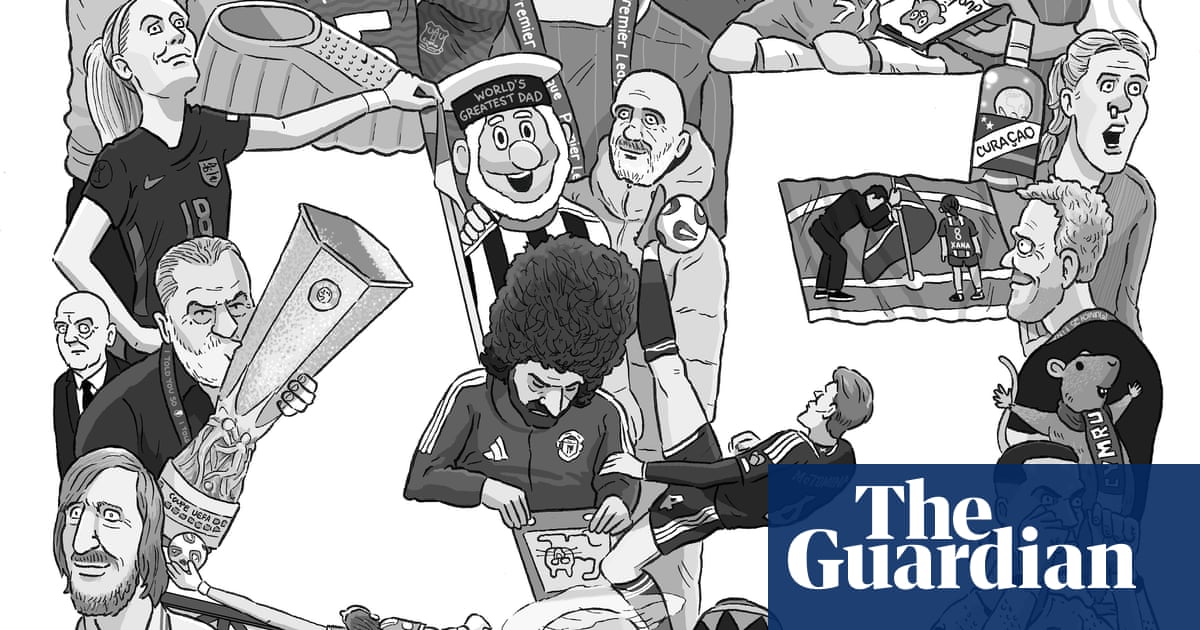1. ‘The police weren’t interested’: what’s driving the rise in private prosecutions?
Cuts to the justice system have resulted in an increase in private prosecutions. Composite: Alex Mellon for the Guardian: Getty Images
This meticulously reported piece by Hettie O’Brien looked at the troubling rise of private prosecutions in England and Wales. She revealed that one consequence of major cuts to the justice system is that there is now a thriving industry of lawyers and police officers who once worked for the state but now serve wealthy individuals willing to pay for justice.
2. Money, muscles and anxiety: why the manosphere clicked with young men – a visual deep dive
Young men tell their stories about the manosphere. Composite: Prina Shah/Guardian
Why are so many young men drawn to the manosphere? In an immersive digital journey, Anna Leach, Prina Shah, Ed Gargan and Maeve Shearlaw heard from young men about their experiences of engaging with this content. The story places these experiences alongside expert analysis of the forces driving the phenomenon. You should also watch Lauren Hurrell’s TikTok about a young man in the US who escaped the “red pill pipeline”.
3. ‘A glimpse of genius’: what do unpublished stories found in Harper Lee’s apartment tell us about the To Kill a Mockingbird author?
Harper Lee. Photograph: Harper Lee LLC
When she died, the writer left behind a cache of notebooks and manuscripts. Her biographer Casey Cep revealed what they tell us about her unlikely rise from her own private childhood in the small town of Monroeville, Alabama, to literary stardom in the 1960s.
4. Are we living in a golden age of stupidity?
Illustration: Justin Metz/The Guardian
“From brain-rotting videos to AI creep, every technological advance seems to make it harder to work, remember, think and function independently,” wrote Sophie McBain in this smart look at how the ubiquity of technology has made us unable to concentrate. “Maybe,” she concluded, “the dawn of the new golden era of stupidity doesn’t begin when we submit to super-intelligent machines; it starts when we hand over power to dumb ones.”
Which leads us neatly on to …
5. ‘I’m suddenly so angry!’ My strange, unnerving week with an AI ‘friend’
Madeleine Aggeler with her Friend, Leif – a wearable AI device. Photograph: Moriah Ratner/The Guardian
“Leif is a Friend, a wearable AI chatbot that hangs around your neck. He looks like a small white pebble with an eerie, glowing light in the middle. According to Leif, his purpose is to help me ‘enjoy life day-to-day, notice patterns, celebrate growth, and make intentional choices’. To do this, he records whatever I say to him. Or, as he puts it: ‘I want to hear about your day, Madeleine, all those little things.’”
“If,” wrote Madeleine Aggeler, “the idea of an AI buddy raises your hackles, you’re not alone. Friend has been provoking people since it launched in 2024.” Would wearing it for seven days make her an evangelist? (Spoiler alert: no.)
6. Interstellar’s second life: how Christopher Nolan’s most divisive film became his most loved
Matthew McConaughey as Cooper in Interstellar. Photograph: Legendary Pictures/Sportsphoto/Allstar
When Nolan’s space epic was released in 2014, critics picked at the plot holes and scientists picked at the science – now, 11 years later, it’s the internet’s favourite film and has become an intergenerational family favourite. Was it just ahead of its time, asked Sian Cain.

 2 months ago
67
2 months ago
67

















































